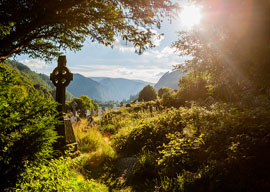
March 30, 2016

Source: Bigstock
The traditional Irish predilection, however, was toward smaller-scale political organization. The opening line of Paul Johnson’s history Ireland is:
The English presence in Ireland arose from the failure of Irish society to develop the institution of monarchy. The Irish, of course, had kingship; too much of it, indeed…. Ireland had about 150 kings at any given date…
Thus, in 1167, King Diarmait Mac Murchada of Leinster, tired of being pushed around by High King Ruaidri mac Tairrdelbach Ua Conchobair, invited in some Norman mercenaries. Normans were Frenchified Vikings, those terrifyingly venturesome warriors who had decapitated the English nation-state in 1066 and whose patchwork empire then included Sicily and Antioch in West Asia. What could possibly go wrong if a local Irish king asked in the Normans?
One lesson of Irish history might be that it’s better to tolerate your annoying neighbors rather than bring in people from beyond the seas to help you win your petty domestic disputes. (But that’s not a popular realization these days in which the Democrats proudly boast that they will import enough foreigners to make America a permanent one-party state.)
The modern world is largely organized around nation-states that tend to be, not coincidentally, within an order of magnitude of the size attained by the kingdom of England as far back as the 10th century.
The existence for more than a thousand years of England as a politically unified nation-state of about 50,000 square miles”large enough to be considered a Great Power up until 1956″has had tremendous consequences for the political map of Europe and the world.
The peoples of the Continent found themselves in need of organizing themselves politically at scales at which they could resist English predation, an option that the limited size of the island of Ireland precluded for the Irish.
For example, the patron saint of French territorial nationalism, Joan of Arc, rejected the invading English king’s genealogical claim to the French throne on the grounds the English had their own damn country:
You, men of England, who have no right to this Kingdom of France, the King of Heaven orders and notifies you through me, Joan the Maiden, to leave your fortresses and go back to your own country…
The influential 1851 book by Sir Edward Creasy, The Fifteen Decisive Battles of the World, declared St. Joan’s 1429 victory over the English at Orleans as the struggle in which she “rescued her country from becoming a second Ireland under the yoke of the triumphant English.”
It seems in 2016 as if Ireland has more or less enjoyed a Happy Ending after 850 years of troubles.
The next question, though, will be if the Irish have the fortitude to hold on to their country. Or, as the economy picks up, will they drift back to the brainless immigrationism that was so fashionable before the disaster of 2008?